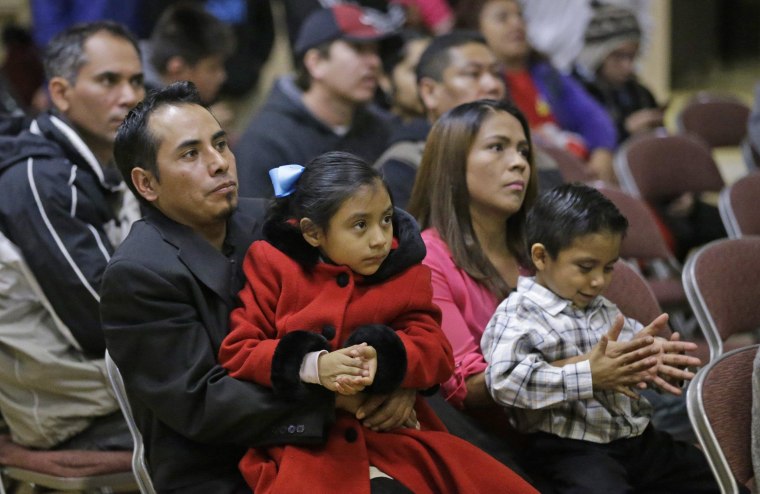A new national poll examined Latinos' views on the state of their health and the Affordable Care Act as well as how being Hispanic shapes others' views of them, especially in the context of immigration.
On health, the Affordable Care Act has considerably boosted insurance coverage among Latinos, yet many were still not familiar with key aspects of the law.
On identity and how they are perceived, a majority of Hispanics believe there is an anti-Latino and anti-immigrant hostility that is intertwined regardless of status.
NBC News obtained a preview to the National Latino Health Survey Poll by the Robert Wood Johnson Foundation (RWJF) Center for Health Policy at the University of New Mexico, conducted by the polling firm Latino Decisions. The findings will be released to the public on Wednesday.
Here are some takeaways of the national survey:
Health:
Latinos have made significant inroads in health care coverage following the Affordable Care Act, yet there are still a sizable number of Hispanics who are not familiar with the insurance marketplace nor have tried to access information about insurance options.
“The take home message is that clearly the Affordable Care Act is working, but there is still a lot of room for improvement. Most Latinos are still not touched by the outreach effort," ” said Gabriel Sánchez, the RWJF Center's executive director and director of research at Latino Decisions.
Hispanic access to health coverage has increased about 10 percent since a previous survey in 2013; currently 82 percent said they had health insurance, primarily through their employer (38 percent) or through Medicare and Medicaid (19 and 12 percent). But only 8 percent said they got coverage from a new health insurance marketplace, and less than 30 percent called or visited a website to learn about insurance options during the last enrollment period. Of those who did, about 1 in 5 said they experienced problems that prevented them from enrolling and 1 in 10 said cost remains a problem.
When asked whether their health care situation would improve, stay the same or get worse under the ACA, most Latinos (76 percent) said it would stay the same or get better, and 19 percent said worse.
Seventy three percent of Latinos reported being in good, very good or excellent health.
Identity, Discrimination and Immigration
An large majority of Latinos felt there is definitely (40 percent) or somewhat (38 percent) an anti-HIspanic or anti-immigrant environment; 18 percent thought this was not the case. When asked if they felt the hostility was more anti-immigrant, more anti-Hispanic or if it was both regardless of immigration status, a little more than half thought it was both, with about a quarter thinking it was more anti-immigrant.
When respondents were asked to name the main reason why they they think they had been treated unfairly during a previous occasion, almost half (48 percent) said they felt it was because they were Latino, a much higher number than because of their language or accent (16 percent) or skin color (13 percent). By comparison, only 2 percent felt they were discriminated because of their weight or sexual orientation. Almost 4 in 10 said that if someone saw them walking down the street, that person would assume they were Hispanic or Latino.
And though three-quarters of those surveyed were either citizens or legal permanent residents, 13 percent said they had avoided talking to police or reporting a crime because they did not want to be asked or bothered about their citizenship status. “This is an important takeaway, considering only a very small segment of our sample was undocumented,” said Sanchez.
One in 10 Latinos said they avoided renewing or applying for a driver’s license or even driving a relative to the airport because they did not want to be asked about their citizenship status. One in five said they had been treated unfairly by police and law enforcement.
"As a result of the high numbers of deportations over the past few years of mostly Latin American immigrants, Latinos in the United States have a perception that immigration policies are targeting their community specifically," he added. "This is compounded by the personal connection many Latinos, regardless of citizenship status have to undocumented immigrants. This is reflected in our data where a very high number (61 percnet) of Latino adults across the country know someone personally who is undocumented."
Thirty six percent reported knowing someone who has faced detention or deportation for immigration reasons.
Latino Decisions surveyed 1,005 Latino adults in either English or Spanish using land lines and cell phones.
